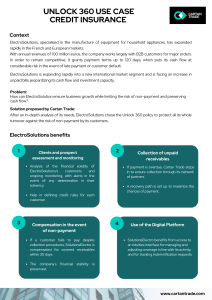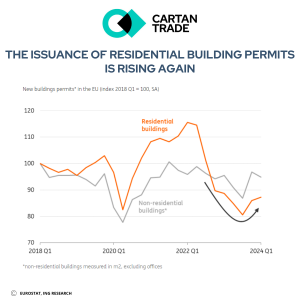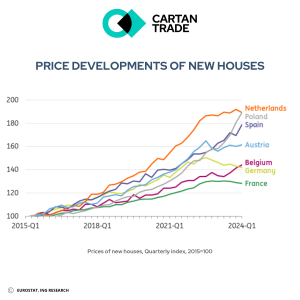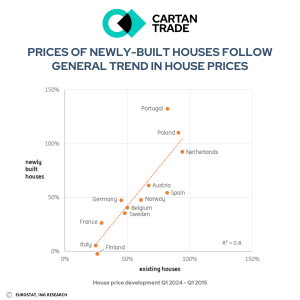At the Helm: Sébastien Guidoni, a Leader with a Unique Background Shaped by Engineering, Finance, and International Experience
His journey is that of a man driven by challenges and impact.
A Distinctive Path Guided by Curiosity and Ambition
Originally from Corsica, Sébastien Guidoni has carved out an unconventional career path that reflects his bold and determined personality. From preparatory classes in Paris to Grenoble Institute of Technology, he nurtured a passion for solving complex problems:
“I loved understanding, breaking things down, improving them. Engineering was a natural fit for that.”
During his time as president of his school’s Junior Enterprise, he also discovered a strong interest in leadership and strategy.
After an initial experience at Altran, he took a calculated risk by moving into finance—despite the doubts of those around him. At AGF Bank and later at AXA, where he spent 13 years, he thrived across three continents—Europe, Africa, and South America—building expertise in managing high-stakes situations.
“I’ve always enjoyed operating in different, sometimes unpredictable environments. I encountered unique cultures, learned to anticipate issues, and to solve them effectively.”
Between surf sessions and nature getaways with his family, Sébastien developed a management approach that blends emotional intelligence with strategic foresight. It’s this combination that makes him a leader who can turn challenges into growth opportunities.
Cartan Trade: An Ambitious Venture
Back in France, after advising and helping structure the HR operations of another startup, Sébastien decided to fully commit to a high-potential project. He joined Cartan Trade in 2023 to support its transformation and quickly became CEO.
“Autonomy and creativity have always felt natural to me. Leading a startup is a constant challenge, but that’s exactly what drives me every day.”
Cartan Trade positions itself as an innovative player in trade credit insurance, bringing fresh capacity to a market long dominated by three major players. By combining traditional credit insurance with simple, modern, digital solutions, the company equips SMEs, mid-caps, and banks with practical tools to secure transactions and fuel growth.
Backed by prominent financial partners such as SV One SAS (SCOR Group), Bpifrance, Intact Financial Corporation, and Bpifrance Le Hub as its operational partner, Cartan Trade offers coverage against payment defaults while facilitating access to tailored financing. Within just two years, the company has doubled its revenues and established a presence in several European markets.
Sructuring and Scaling Cartan Trade
When Sébastien Guidoni joined Cartan Trade, the company was undergoing a transformation.
“There was a clear need to strengthen the team in order to manage revenue growth and reduce cash burn. The transition was quick, but it felt natural—for me, for management, and for the investors.”
His mission was clear: to structure the company and redefine a winning strategy.
From day one in October 2023, he implemented strategic adjustments that restored confidence among teams and partners.
“It’s like joining a new team as a player—you have to quickly find your footing while bringing fresh energy.”
This repositioning stabilized Cartan Trade’s operations and fine-tuned its business model for accelerated growth.
A Market Vision Rooted in People and Technology
For Sébastien, credit insurance isn’t just about numbers and algorithms.
“We can disrupt this market, but not just through technology. What really makes the difference is people.”
He’s committed to building a team with diverse, complementary skill sets, where everyone contributes unique value.
That said, technology remains a core pillar of Cartan Trade’s model:
“Data helps us detect weak signals, anticipate risks, and deliver tailored solutions. Over the next 10 to 15 years, these signals will become even more critical.”
Tomorrow’s Challenges
Despite its impressive growth, Cartan Trade still faces major challenges:
“We need to build the right company culture, manage the scarcity of resources typical of startups, and most importantly, bring everyone along for the journey—teams, investors, partners.”
The tech challenge is equally vital:
“To go from €10 million to €30 million in revenue, our model has to scale. Within the next three years, we need to prove that scalability and reach breakeven so we can accelerate from there.”
Another key challenge is international expansion. While the company has already grown in France, Italy, and the Benelux, it’s aiming to widen its reach. This ambition relies on a dual strategy: controlled expansion and the ability to adapt to local economic realities.
The Ultimate Goal? Becoming a Market Leader
“Within 10 years, we want to be seen as a consolidator, not the consolidated. I’m setting the bar high—but I know my team can do it.”
Combining strategy, resilience, and long-term vision, Sébastien Guidoni continues to chart his path, ready to reshape an evolving industry—through innovation, collaboration, and a compelling ability to rally teams and partners behind a shared mission.








